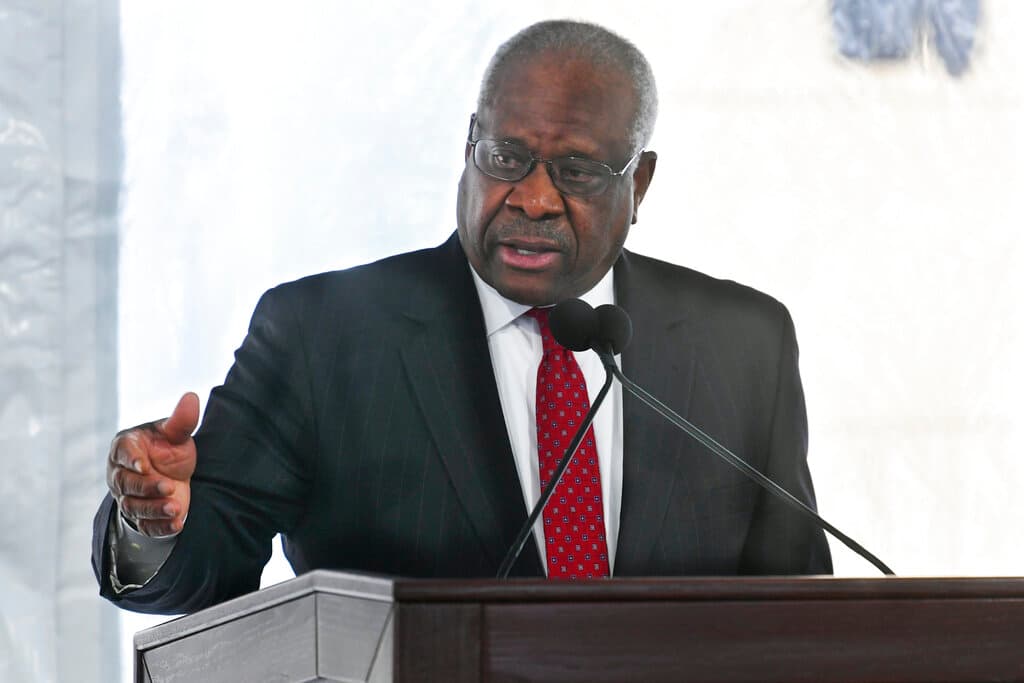Democrats Racing To Make Supreme Court an Issue in 2024 Presidential Campaign
The justices face heat from liberals on the campaign trail and on Capitol Hill.

With America on tenterhooks for Supreme Court decisions on affirmative action, student loan forgiveness, religious liberty, and more, Democrats are mobilizing to put the high court squarely on the ballot in 2024 even as they seek to bind it by congressional fiat.
A raft of left-leaning organizations this week are launching United for Democracy, a $1 million advertising campaign targeting five senatorial campaigns where Democrats are defending seats: in Pennsylvania, Arizona, Wisconsin, Nevada, Montana, and the District of Columbia. It urges viewers to “tell Congress to rein in the dangerous Supreme Court.”
United for Democracy says it aims to “harness growing outrage at extreme justices to mobilize the American people, advocates, experts, and political leaders and demand that Congress rein in the Court.” Its backers include the American Federation of Teachers, Planned Parenthood Action Fund, MoveOn, March For Our Lives, and the Black Voters Matter Fund.
The campaign’s manager, Stasha Rhodes, notes in a statement: “Our campaign hopes to create a coordinated effort to call out the Supreme Court and educate people about the impact it is having on their lives.” One video clip features a Catholic priest, identified only as Rick, saying, “I’m worried the Supreme Court has been captured by right-wing extremists.”
Ms. Rhodes adds: “There is an existential feeling that nothing can be done about this particular body of government. And we want to make clear that that’s not true.” She pinpoints “ethics” and “court expansion” as two “smart ideas for making the Supreme Court more accountable and transparent.”
Ms. Rhodes notes that she wants to “pressure” politicians to “take action” against the court. At least one appears willing to plunge. Senator Whitehouse, in support of the campaign, told NBC News that he backs this move to oppose the “united effort to capture the court and turn it into a weapon of the far-right wing.”
United for Democracy’s launch comes as Mr. Whitehouse convened a hearing on Capitol Hill titled, “Ensuring an Impartial Judiciary: Supreme Court Ethics, Recusal, and Transparency Act of 2023,” centered on legislation the senator introduced in February that would try to require the court to accept a binding code of ethics, codify recusal procedures, and demand extensive disclosures. No Republican members attended.
It’s unclear whether the Constitution grants Congress authority to bind the Supreme Court in this fashion.
At the hearing, Mr. Whitehouse lamented that he has offered “solutions” for the conundrum of judicial ethics. He asserted that the American people “are tired of waiting” and that “from the very first days of this republic Congress has regulated judicial conflict of interest.” In halting Latin, he declared the maxim Nemo judex in causa sua, or “no one is judge in their own case.”
The Latin might be elegant, but the thought is not necessary good law. There exists a principle — the rule of necessity — that requires a judge who can’t be replaced from ruling in even cases in which the judge has an interest. One statement of the rule, published by the University of Baltimore, says:
“The rule of necessity is a judicial doctrine that permits a judge or agency decision maker to decide a case even if he or she would ordinarily be disqualified due to bias or prejudice. The rationale of the doctrine is that if there is no other person who can make the decision, let the biased person decide the case rather than have no decision made at all.”
At the hearing, Mr. Whitehouse displayed particular interest in Justice Clarence Thomas, observing that the justice has “refused to recuse” from cases relating to the events of January 6 “for more than a year,” despite what the senator described as a conflict of interest stemming from the political activities of the justice’s wife, Virginia “Ginni” Thomas.
Mr. Whitehouse asked: “What did Justice Thomas know about his wife’s insurrection activities and when did he know it?”
Next came Senator Durbin, who is the Judiciary Committee’s chairman. He described his devotion to “finding solutions to the ethical shortcomings of the Supreme Court,” and argued that the “highest court on the land should not have the lowest ethical standards.” He observed that “one person can cure” the malady of an ethically compromised court: Chief Justice Roberts.
Mr. Durbin, in a thinly veiled swipe at Justice Thomas, proposed: “Let’s not have another summer of justices jetting off on luxury junkets.” He had kinder words for Justice Elena Kagan, who recently broke with more than a century of precedent and cited the Code of Conduct for United States Judges — which does not bind justices — to explain her stepping aside from a case. Mr. Durbin cited this as proof that she “gets it.”
A professor at Antonin Scalia Law School, Jennifer Mascott, offered a dissent. She recalled that constitutionally, Congress’s authority to touch the judiciary is “pegged to the power to establish inferior tribunals” and the “Necessary and Proper” clause. There is not, she notes, “an unbounded authority to regulate.”
The executive director of a watchdog group called Fix the Court, Gabriel Roth, tells the Sun, “I think a lot of people look at the Supreme Court and say, ‘Ot’s at the top, so there’s nothing we can do to change how it operates.’ Now that’s true when it comes to its decision-making but false when it comes to the court’s ethical character.”
Mr. Roth urges consideration of “proposals on ethics enforcement, travel transparency, and gift bans.” Just before the committee hearing, Mr. Whitehouse tweeted: “From rolling back fundamental rights to flouting basic ethics standards, it’s no surprise the Supreme Court has lost the trust of the American people.”

